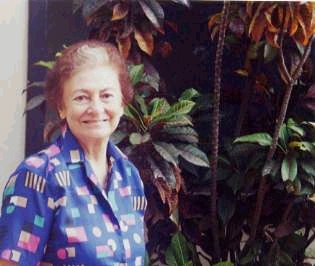
"This communication is on the "hot line" for special and happy news concerning Ms. Deloraine Brohier, President of The Dutch Burgher Union of Sri Lanka
R. L.
Brohier's daughter talks about growing up in old Ceylon
By Marcus Doherty
I had the pleasure of visiting Deloraine Brohier at her home in Colombo. It was my first encounter with the author of The Saga of the Colombo Club and I immediately found her to be a very interesting and refined woman with an air of youthfulness.
After receiving a very hospitable welcome, Deloraine began talking about
her childhood and her concerns for children today. She believes her
varied life was a direct result of the environment in which she grew up.
Her father Richard Leslie Brohier was instrumental in her writing career
and her love of travelling. She said; “I was always encouraged to
write and explore Sri Lanka’s countryside. I was always learning about
wildlife, customs and about all kinds of flowers. Nowadays children are
left in front of a television with no guidance or input other than what
comes through the box. Children grow but grow without guidance – we
never had a television or even a radio growing up.”
Her ancestry is clear from the
moment you enter the living area, which has many ornaments and artefacts
of a Dutch tradition. Deloraine belongs to a group of Sri Lankans known
as ‘Burghers’. Her family is of a Huguenot-French decent – the
first of the Brohiers having arrived in Sri Lanka in 1777.
Deloraine’s father worked for
the Survey Department and continually moved between outposts, when he
wasn’t based in Colombo. The family was travelling from post to post
where she said her education began. “My parents would not let us
children sleep when we travelled. My mother Werkmeister Pansy, was a
teacher and she would be pointing out flowers and wildlife to us on the
roadside, while my father would draw our attention to landmarks and tell
us the story of battles long ago,” said Deloraine. “Seeing through
the eyes of my parents opened up a real vista, we were gradually
awakened to an education of observation,” she explained.
Deloraine graduated in 1950 from
University Ceylon, Colombo and enjoyed a short stint as a teacher until
she decided teaching was not for her and became a scriptwriter at Radio
Ceylon, eventually moving into broadcasting.
“I really enjoyed my time
there, it was a good experience” she reflected, adding “the work,
places, people were all very interesting and of great value for my next
job at the United Nations”.
It was the mid 1970’s when she
worked for the UN in New York City, where she used the opportunity to
travel, visiting Boston, Oregon and Florida. It was a habit ingrained in
her since childhood and a trait of her father.
Her father was born in Colombo
and left school to enrol at technical college where he studied
surveying. With hard work, perseverance and a helpful word from D.S
Senanayake, the then Minister of Lands and Land Development, he made his
breakthrough into the Survey Office as Supernumerary Surveyor in 1910.
His talent was not to go unnoticed, dipping yet again into his reserves
of energy and determination he gradually climbed the ladder and by 1933
was the Superintendent of Surveys. It was during this period that he
commenced writing his work on Ancient Irrigation Works in Ceylon – the
first volume he completed inside three months. Two more were to follow
and the writings remain the most highly regarded source on the subject.
He was not only a talented writer, his thirst for knowledge was limitless. He was also critical of the way people explored the deep jungle and countryside of the island.
“My father would walk into deep
jungle and pitch a tent, staying there for days” said Deloraine. “He
would spend his time exploring, writing about the wildlife and the
vegetation and would speak to villagers and local Buddhist monks. I
remember sitting with some village people in the thick jungle and how
hospitable they were to us,” recalled Deloraine.
“He had such enthusiasm, he
once found old picture plates of Dutch furniture, so he preserved them
and published them in a book called ‘Furniture of the Dutch Period in
Ceylon’.” His journeys into the forests and jungles also led to
books entitled “Seeing Ceylon” and “Food and the People”.
Richard Brohiers illustrious
career continued even until after his retirement. His achievements in
the role of Assistant to the Surveyor General, and his appointment to
act as the Deputy Surveyor General during the late 1940’s, prompted
D.S Senanayake to make a special request. In 1950 he accepted the
invitation to serve as a Member on the Gal Oya Development Board.
When Deloraine returned to Sri
Lanka from her work with the UN, the minister of tourism invited her on
the board of directors, a seat she occupied for nine years.
Like her father she was also
awarded the Order of Oranje-Nassau. Deloraine continues in her role as
woman president of the Dutch Burger Union and her desire for travel is
still thriving.
The account of her life, as well as her father’s can prompt a person to reflect on their own life. Her story serves as a worthy reminder as how detrimental television and a sheltered existence can be to a child and conversely, how educational the world outside remains.